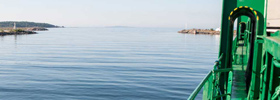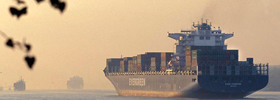Environmental protection
Environmental protection in ocean shipping is an international issue
The importance of environmental protection in ocean shipping is steadily growing. Shipping puts a considerable strain on the marine environment by releasing oil, chemicals, sewage and garbage as well as by emitting engine exhausts. It is estimated that globally about 50,000 seagoing ships consume about 370 million tons of heavy grade oil per year.
On the other hand ocean shipping is spearheading environmental protection. Seagoing ships compare favourably with all other means of transport as regards CO² emissions. Sea transportation is highly energy efficient and therefore environmentally friendly. New provisions for treatment of ballast water and for reduced sulphur content in ship’s fuels and exhausts will protect the marine environment even better.
As shipping has always been a global business, most regulations for the protection of the marine environment are established by the International Maritime Organisation (IMO). The most important regulatory instrument in this context is the International Convention for the Prevention of Pollution from Ships, in short: MARPOL. The MARPOL convention with its six annexes contains mandatory provisions to prevent pollution by ships and is permanently amended.








